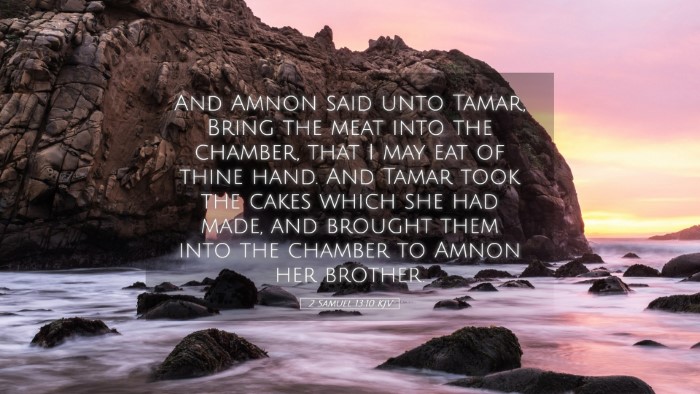Commentary on 2 Samuel 13:10
2 Samuel 13:10 states: "And Amnon said unto Tamar, Bring the meat into the chamber, that I may eat of thine hand. And Tamar took the cakes which she had made, and brought them into the chamber to Amnon."
This verse is pivotal as it sets the stage for a tragic narrative in the life of Amnon, Tamar, and Absalom. The events surrounding this verse highlight themes of desire, manipulation, and the grave consequences of unchecked lust. Here, we combine insights from esteemed public domain commentaries to explore the depth of meaning embedded in this narrative.
Contextual Background
A comprehensive understanding of 2 Samuel 13 requires its historical and literary context. This chapter records a disturbing incident involving Amnon, the eldest son of King David, who is infatuated with his half-sister, Tamar, the daughter of David and Maacah. The familial and royal dynamics are crucial to understanding the motivations of the characters involved.
The Art of Deception
Amnon’s request for Tamar to bring him food is a calculated act of deception. According to Matthew Henry, Amnon's strategy reveals his intention to exploit familial bonds for his selfish desires. He feigns illness, a ruse that accentuates the theme of manipulation:
- Feigning Illness: Amnon pretends to be ill, seeking vulnerability in order to isolate Tamar.
- Familial Trust: His request is cloaked in the guise of familial love and care, making it easier for Tamar to comply.
- Isolation: By asking Tamar to come into his chamber, he sets the stage for his ulterior motives without suspicion.
Tamar’s Role and Vulnerability
Tamar is depicted as innocent and unaware of the true nature of Amnon's intentions. Adam Clarke emphasizes Tamar's position as both a victim and a tragic figure:
- Innocence: Her willingness to care for her brother reflects her virtue and trust, highlighting the tragedy of her vulnerability.
- Cultural Context: As a woman in a patriarchal society, Tamar has limited power to resist or challenge Amnon's desires.
- Isolation Again: The private chamber symbolizes a place devoid of external accountability, which amplifies her vulnerability.
Amnon's Sin and its Consequences
This verse culminates in Amnon's eventual act of violence against Tamar, which illustrates the broader consequences of sin. Albert Barnes comments on how Amnon's unchecked desires lead to catastrophic outcomes:
- Desire Leads to Sin: Amnon’s lust transforms into an uncontrollable urge, blinding him to the moral implications of his actions.
- Ripple Effects: The sin committed here has wider ramifications—leading to Absalom's revenge and profound familial discord.
- Divine Judgment: This incident is emblematic of how sin in David’s household mirrors the consequences of David’s own sin (i.e., Bathsheba), highlighting a familial cycle of transgressions and divine retribution.
Theological Reflections
This passage invites deep theological reflection regarding human nature, sin, and the complexities of relationships:
- Human Nature: It reveals the dark inclinations of the heart and the potential for manipulation within relational dynamics.
- Divine Sovereignty: Throughout the narrative, one can trace the unseen hand of God working amidst human failings and moral decay.
- Forgiveness and Redemption: The tragic outcomes prompt a need for healing, justice, and ultimately, redemption, themes that resonate through the entirety of Scripture.
Conclusion
The story encapsulated in 2 Samuel 13:10 reveals profound truths about human behavior, the nature of sin, and the tragic consequences that can ensue from acting on lustful desires. Pastors, students, theologians, and Bible scholars should approach this text not only as an isolated incident but as a reflection of larger biblical themes regarding morality, accountability, and the need for divine grace. The account urges modern readers to contemplate the importance of integrity and the protection of the vulnerable within society and the church.


